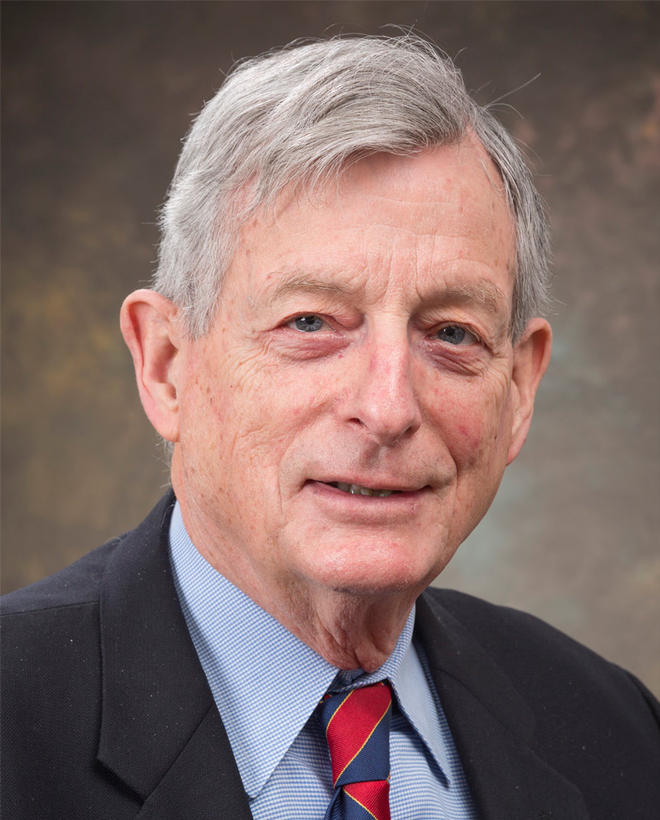Peter B. Moore


Peter B. Moore ’61 B.S.
Distinguished scientist, you are best known for your studies of the structure of the ribosome, the cellular machinery for making proteins, which are essential for life and have implications for pioneering medical advances. Generous collaborator, mentor, and Yale community citizen for more than fifty years, known for your high standards, integrity, and professionalism, you have always been a champion and exemplar for what you insist the world needs: a devotion to basic science, which does not start with a specific aim, but leads to discoveries no one yet has imagined.
Ardent partisan of the laboratory arts, Yale honors you for your contributions to science, and to your university, as we gratefully award you your third Yale degree, Doctor of Science.
Peter Bartlett Moore, Sterling Professor Chemistry, Emeritus and Professor of Molecular Biophysics and Biochemistry, Emeritus at Yale University, is a renowned chemist celebrated for his pioneering contributions to the understanding of ribosomal structure and function. His work has significantly advanced the field of molecular biology, providing critical insights into the mechanisms of protein synthesis.
Born in 1939 in Boston to Laura Bartlett Moore and Francis Daniels Moore, a surgeon responsible for many important advances in patient care, Moore’s early fascination with the natural sciences led him to pursue an education that would shape his career. He earned his bachelorr’s degree in biophysics from Yale University in 1961, summa cum laude. Moore obtained his Ph.D. at Harvard University in 1966 in the lab of James D. Watson, and then performed post-doctoral work at the University of Geneva and the Laboratory of Molecular Biology in Cambridge, England. At the time he graduated, Moore had no idea he would ever return to Yale, and so, after deciding he wanted to work in academia, he was surprised to find himself with a position as an assistant professor at his alma mater in 1969. Moore became a full professor in 1979 and was appointed the Eugene Higgins Professor of Chemistry in 1997.
Moore’s research focused on the structure and function of ribosomes, the molecular machines that synthesize proteins in all living cells. Together with his Yale colleague, Thomas A. Steitz, Moore utilized X-ray crystallography to determine the detailed structure of the large ribosomal subunit, a breakthrough that revealed the molecular basis of protein synthesis. This advance led to experiments that revealed how many of the antibiotics that inhibit protein synthesis work, and how bacteria become resistant to them. This information continues to guide the work of those who are developing new antibiotics. Moore was well-known for his clarity of thought in the classroom, and for defining and upholding the most rigorous academic standards.
“My father often advised me that, when faced with dilemmas, I should always commit rather than omit. It was good advice.”
Moore is a member of the National Academy of Sciences and has received prestigious recognitions such as a Guggenheim Fellowship, the Yale Scientific and Engineering Association Award for Advancement of Basic and Applied Science, a MERIT Award from the National Institutions of Health, the Lewis S. Rosenstiel Award for Distinguished Work in Basic Medical Research from Brandeis University, and the Newcomb Cleveland Prize from the American Association for the Advancement of Science. Moore has served on advisory committees and review panels for the National Institutes of Health, the National Science Foundation, and several national laboratories.
At Yale, Moore has served in multiple capacities, including as chair of the Department of Chemistry, and as a member of the University Budget Committee, the Faculty Restructuring Committee and the Science Facilities Planning Committee. He served as president of the Biophysical Society and as chairman of the biophysics section of the National Academy of Sciences. Moore’s commitment to teaching and fostering new generations of scientists is evident in his long-standing tenure at the university, where he guided countless students through their academic and research endeavors. Despite retiring in 2010, Moore remains a trusted advisor to his Yale colleagues, and to the national and international communities of science.
Moore resides in North Haven, Connecticut with his family, and believes that undergraduates at Yale should take advantage of the research opportunities on campus just as he did.